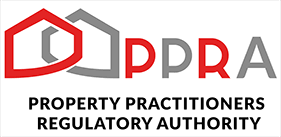A property practitioner is not entitled to a commission unless he/she is registered and possesses a valid FFC
Understanding Commission in the Context of the Property Practitioners Act
Commissions are an important aspect of remuneration for property practitioners across industries. Nonetheless, their claims are strictly regulated by the Property Practitioners Act which came into force on February 1, 2022. The law places high demands on practitioners and ensures transparency, accountability, and legal compliance.
The Definition of Property Practitioners
According to Section 1 of the Property Practitioners Act, property practitioners include all categories of individuals and companies involved in property-related transactions. This includes Agents, Advisers, Agency, Accountants, Attorneys, Auctioneers, Bridging Financer, Bond Brokers, Business Brokers, Consultants, Developers, Homeowners Associations, Managing Agents, and Time Shares, and other persons who are involved in real estate transactions, whether in an individual or legal capacity.
Requirements for Commission Entitlement
The core of the Property Practitioners Act is Sections 47, 48, and 56, which set out strict conditions under which property practitioners are entitled to receive commissions:
Fidelity Fund Certificate (FFC):
Mandatory requirements: Sections 47 and 48 of the Act require all property practitioners, including their directors, members, trustees, and practitioners, to hold a valid Fidelity Fund Certificate (FFC).
Prohibition without FFC: Section 48 expressly prohibits Property Practitioners from providing services unless they possess a valid FFC issued by the Property Practitioners Regulatory Authority (PPRA).
Request for Commission:
Compliance with FFC: Section 56 clearly states that a Property Practitioner is not entitled to receive commission unless he/she is registered with PPRA and holds a valid FFC. Obligation to Repay: Section 48(4) strictly requires that any commission received by a property practitioners without a valid FFC must be repaid immediately upon demand.
Verification and Compliance:
Certification Requirement: The Notary Public shall not pay the commission or related funds unless the Property Practitioner provides a certified copy of the FFC. Legal Consequences: Under Section 48(5), carrying on business without a valid FFC constitutes an offense under the Act and exposes the practitioner to potential legal penalties.
Importance of Compliance and Verification
Given the legal implications and stringent enforcement mechanisms set out in the Property Practitioners Act, it is imperative that all parties involved, whether property practitioners, notarial representatives or clients, ensure compliance with these regulations. Verification of a practitioner’s registration status and FFC validity should be carried out through official PPRA channels or with a legal advisor to minimize the risks associated with non-compliance.
How to Check Registration Status
To check if a property practitioners has a valid FFC, parties can visit the official PPRA website (https://theppra.org.za) or contact a legal expert specializing in real estate law.
This verification process is essential to avoid potential litigation and ensure that all parties involved in real estate transactions comply with the regulatory framework established by the law.
Conclusion
Commissions remain a fundamental component of property practitioner remuneration as they reward performance and drive business within the industry. However, under the Real Estate Practitioners Act, the right to receive commissions is strictly dependent on the practitioner’s registered status and possession of a valid PPRA FFC. Failure to comply with these regulatory requirements will not only jeopardize the practitioners right to receive commissions but also expose him to legal consequences as provided for by the law. By understanding and adhering to the provisions outlined in sections 47, 48, and 56 of the Property Practitioners Act, stakeholders can ensure transparency, ethical conduct, and legal compliance in all property-related transactions. For further guidance or verification of registration status, stakeholders are encouraged to utilize the resources provided by the PPRA or seek legal advice to navigate the complexities of commission entitlement under this regulatory framework.








